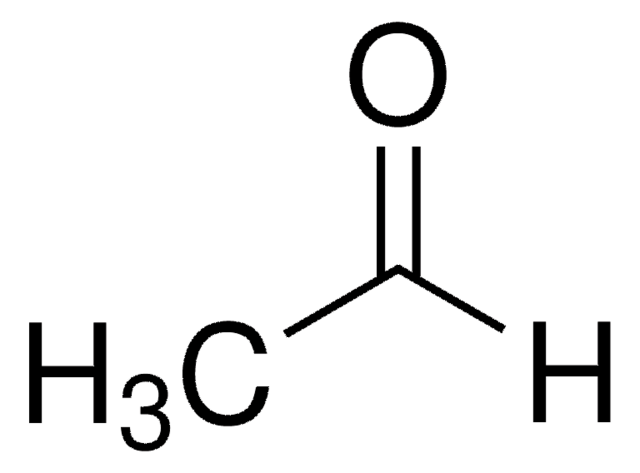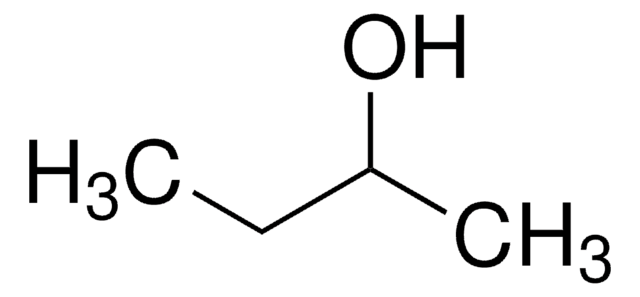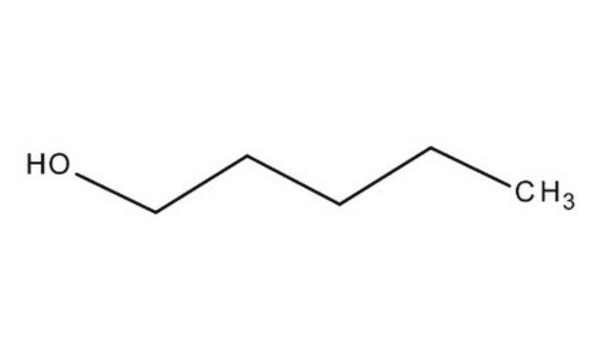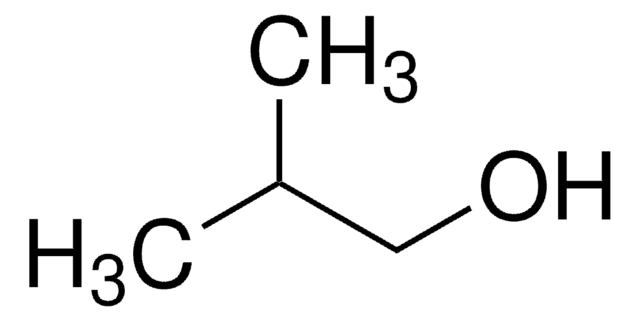76929
1-Pentanol
puriss. p.a., ACS reagent, ≥99.0% (GC)
Synonym(s):
n-Amyl alcohol, Pentyl alcohol
About This Item
Recommended Products
grade
ACS reagent
puriss. p.a.
Quality Level
vapor density
3 (vs air)
vapor pressure
1 mmHg ( 13.6 °C)
1.5 mmHg ( 20 °C)
Assay
≥99.0% (GC)
form
liquid
expl. lim.
10 %, 100 °F
impurities
substances darkened by H2SO4, in accordance
≤0.005% free acid (as CH3COOH)
≤0.1% carbonyl compounds (as HCHO)
≤0.1% water
evapn. residue
≤0.002%
color
clear
refractive index
n20/D 1.409 (lit.)
n20/D 1.410
bp
136-138 °C (lit.)
mp
−78 °C (lit.)
density
0.811 g/mL at 25 °C (lit.)
cation traces
Al: ≤0.5 mg/kg
Ba: ≤0.1 mg/kg
Bi: ≤0.1 mg/kg
Ca: ≤0.5 mg/kg
Cd: ≤0.05 mg/kg
Co: ≤0.02 mg/kg
Cr: ≤0.02 mg/kg
Cu: ≤0.02 mg/kg
Fe: ≤0.5 mg/kg
K: ≤0.5 mg/kg
Li: ≤0.1 mg/kg
Mg: ≤0.5 mg/kg
Mn: ≤0.02 mg/kg
Mo: ≤0.1 mg/kg
Na: ≤1 mg/kg
Ni: ≤0.02 mg/kg
Pb: ≤0.1 mg/kg
Sr: ≤0.1 mg/kg
Zn: ≤0.1 mg/kg
SMILES string
CCCCCO
InChI
1S/C5H12O/c1-2-3-4-5-6/h6H,2-5H2,1H3
InChI key
AMQJEAYHLZJPGS-UHFFFAOYSA-N
Looking for similar products? Visit Product Comparison Guide
Related Categories
General description
Application
Signal Word
Danger
Hazard Statements
Precautionary Statements
Hazard Classifications
Acute Tox. 4 Inhalation - Eye Dam. 1 - Flam. Liq. 3 - Skin Irrit. 2 - STOT SE 3
Target Organs
Respiratory system
WGK
WGK 1
Flash Point(F)
closed cup
Flash Point(C)
closed cup
Personal Protective Equipment
Choose from one of the most recent versions:
Already Own This Product?
Find documentation for the products that you have recently purchased in the Document Library.
Customers Also Viewed
Our team of scientists has experience in all areas of research including Life Science, Material Science, Chemical Synthesis, Chromatography, Analytical and many others.
Contact Technical Service









